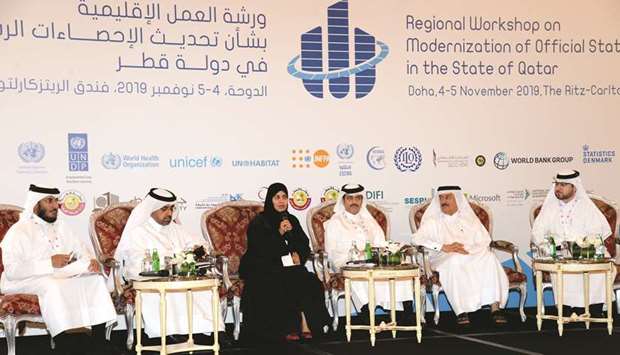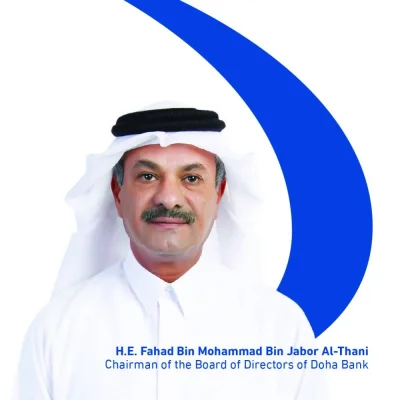A regional workshop on modernisation of official statistics in Qatar, organised by the Planning and Statistics Authority, was attended by representatives of a number of local, regional and international organisations and centres, as well as a number of academics, experts and specialists in the Arab world. The workshop’s goal is to learn about the developments of modernisation in official statistics.
The two-day workshop will discuss the scope of updating official statistics and its role in achieving goals of the Sustainable Development Agenda 2030 and non-traditional data sources of official statistics. The workshop also examines capacity-building frameworks and strengthened partnerships in statistics, the role of innovations in this context, and current statistical shifts.
HE the President of the Planning and Statistics Authority Dr Saleh Mohamed Salem al-Nabit said in a speech during the opening session that the workshop comes in light of the need of countries, including Qatar, to make significant changes in its statistical system in order to collect and disseminate high-quality co-ordinated and reliable data and indicators to provide them to users in a timely manner.
He also pointed out that the workshop also complements the efforts of the country in implementing the project on the agenda of transformation in official statistics adopted by the United Nations Statistical Commission in 2016, in which Qatar was selected as the leading country in the field of modernisation and statistical transformation.
He pointed out that the holding of this event in Doha comes in response to the calls of the UN on more than one occasion, including the declaration of the High-level Political Forum on Sustainable Development adopted in September 2019, where the emphasis was placed on investment in data and statistics related to the Sustainable Development Agenda 2030 and encouraged international co-operation in the statistical field.
The workshop was a continuation of the dialogue initiated in Doha two years ago on the modernisation of official statistics in order to prioritise the transformation of the national statistical system in partnership, with various international, regional and local committees. Its view was to take practical steps towards a new structure of the local statistical system, taking advantage of the rapid technological developments and professional development at the statistical level.
Dr al-Nabit pointed out that the modernisation of the statistical system includes the promotion of methodologies and tools related to economic, social and environmental aspects in order to enable them to produce high quality data to fill the gaps in databases and to support sustainable development policies and others. He added that building human capacity and employing contemporary technology in the statistical process and using advanced techniques and preparing standards and guidelines, and innovation in technology and techniques and technical means related to statistical production processes.
He stressed the importance of building effective partnerships with all stakeholders to achieve the desired progress to modernise the statistical system and enable it to produce, organize and use the necessary data in decision-making, monitor progress in development processes, assess their societal impacts, provide them to international organizations and follow up their dissemination at the national and international levels.
HE the President of the Planning and Statistics Authority expressed hope that the workshop will contribute to the achievement of the objectives of the Planning and Statistics Authority, specifically the modernisation of the national statistical system of all stakeholders and partners in order to support the implementation of the Second National Development Strategy 2018-2022 and the Population Policy for the same period, as well as the Sustainable Development Goals adopted by the United Nations to achieve the goals and aspirations of Qatar National Vision 2030.
Chief of Data Innovation at the United Nations Statistics Division Ronald Jansen stressed the importance of statistics in implementing the goals and objectives of the 2030 Agenda for Sustainable Development adopted by all member-states in 2015 in order to end poverty, improve health and education, reduce inequality, unlock economic growth and address climate change problems and other goals. The workshop is in the service of these goals in view of the role of statistical institutions and agencies in supporting decision makers to build rational development policies, he said.
Director General of GCC Statistical Center Saber Saeed al-Harbi thanked Qatar for its role in promoting joint GCC statistical work and its active participation in promoting statistical development, saying that this workshop is proof of these successful efforts.
Regional Director of the United Nations Population Fund (UNFPA) Louay Shabana noted the special relationship between the UNFPA and Qatar, especially the Planning and Statistics Authority, over the past years, wishing to continue this relationship to serve common goals and aspirations.
He said that the workshop is an important and necessary step to modernise the official statistical system to cope with the developments and challenges surrounding the collection and dissemination of official statistics in light of the changing balance of stakeholders in the official statistical system.
During the first day’s sessions, Dr Ahmad Hussein from the Planning and Statistics Authority gave a presentation on the scope of modernisation of official statistics, the importance of the modernisation processes and its steps, procedures and stages, the efforts of partners and other related topics.
Monday’s sessions also included a panel discussion in which high-level Qatari figures talked about the progress made in implementing the Sustainable Development Agenda 2030 with its 17 goals and intersections with the Second National Development Strategy 2018-2022.
During the workshop, the Planning and Statistics Authority is scheduled to present a number of presentations on Census 2020 and will provide an overview of the prospects for the national modernization process, as well as the use of advanced technology in the process of data collection, classification, analysis, dissemination and sharing with other categories of users and decision makers in the country, using digital technologies and social media.
The workshop is expected to issue a final declaration (Doha Declaration).

A panel discussion in progress. PICTURES:Thajudheen


